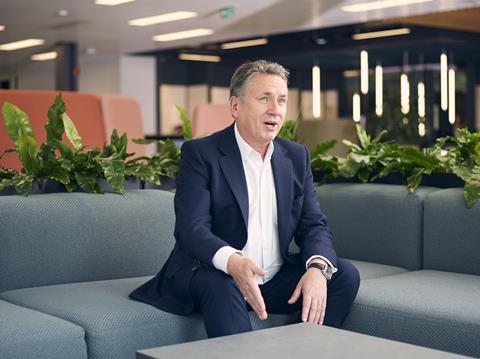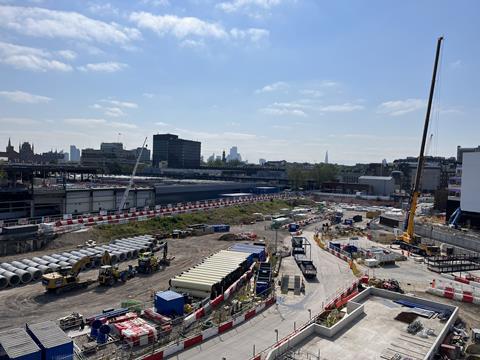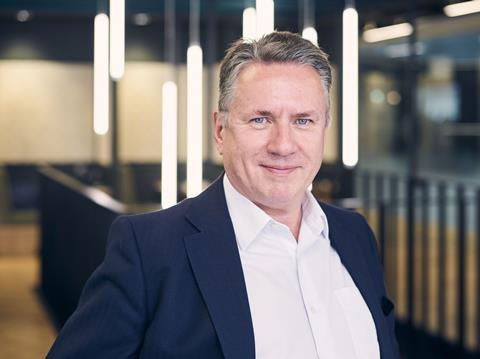Alan Brookes tells Dave Rogers more consolidation in the sector is inevitable, why we should just get on and build HS2 and singing for his supper
ŌĆ£I lived with my granddad. It was his house we were in. My granddad, my mum and dad and me. A semi down by the river in Chester.
ŌĆ£IŌĆÖm not saying we were poor, but I remember going to college and my dad saying, ŌĆśWell, we canŌĆÖt afford anything to pay for itŌĆÖ. So I was fully grant aided. Then you come to this and you think, ŌĆśOh my godŌĆÖ. YouŌĆÖre running 36,000 people and four billion and sometimes you have to pinch yourself.ŌĆØ
Alan Brookes was made chief executive of Arcadis last month, with the 61-year-old taking over from Dutchman Peter Oosterveer to become the first boss of a firm whose heritage stretches back to 1888 who calls the UK his home.
When it was confirmed that he would be in charge of a business whose Ōé¼4bn (┬Ż3.4bn) income exceeds that of most contractors ŌĆō never mind consultants ŌĆō in this country, an old client got in touch.
ŌĆ£He said: ŌĆśDo you remember the heady days in Liverpool, when you were pitching to do a few restaurants for McDonaldŌĆÖs?ŌĆÖ Someone said to me the other week: ŌĆśHow much is the turnover of Arcadis and I said about four billion and he said: ŌĆśWell, that was an easy throwaway lineŌĆÖ and I replied: ŌĆśI try not to think about itŌĆÖ.ŌĆØ

A trained building surveyor, Brookes joined Arcadis when EC Harris, the company he was working for at the time, was bought by the firm in 2011.
EC Harris, in turn, had bought the company that Brookes was in charge of ŌĆō surveyor Povall Flood Wilson ŌĆō at the turn of the century, which before was known as Povall Worthington, later merging with a QS called Flood & Wilson.
He started work for Povall Worthington in 1984, which included one of his more memorable jobs replacing the copper dome roof on the Port of Liverpool building, one of the cityŌĆÖs Three Graces on the waterfront. The newly clad roof looked brown, impressing Brookes so much that he began taking pictures.
The middle ground is always the most difficult ŌĆō you canŌĆÖt quite follow the bigger clients but youŌĆÖre too big for the smaller stuff
ŌĆ£A lovely old lady came up to me and said, ŌĆśItŌĆÖs not the same now itŌĆÖs not green, sonŌĆÖ. Give it a few more months, I thought.ŌĆØ
If BrookesŌĆÖ CV proves one thing, it is that there has always been consolidation in the sector ŌĆō and he thinks there is more to come.
ŌĆ£There are still too many players,ŌĆØ he says. ŌĆ£YouŌĆÖll need a number of players who can handle the big projects and the smaller players who can look after the local clients and want to be in those areas.
ŌĆ£The middle ground is always the most difficult ŌĆō you canŌĆÖt quite follow the bigger clients but youŌĆÖre too big for the smaller stuff.ŌĆØ
Earlier this year, Turner & TownsendŌĆÖs deal for Alinea caught a lot off-guard and shocked many more.
ŌĆ£I wasnŌĆÖt surprised,ŌĆØ says Brookes of the deal. ŌĆ£When I was at Povall Flood Wilson, our biggest client was [electronics retailer] Dixons.
ŌĆ£Dixons said it was branching into Europe, it was going all over Europe. But thatŌĆÖs really expensive to actually start following a client when youŌĆÖve no footprint, to set up locations, to set up entities that probably all need funding and all of this becomes very expensive. ItŌĆÖs a lot of cash.
ŌĆ£There comes a point where you need cash and you need investments. I think everybodyŌĆÖs ambitious, they want to grow. But there comes a point where that growth tips over, where you need to actually then consolidate or join together to follow your clients successfully.ŌĆØ
He was working in Asia when EC Harris was snapped up 12 years ago ŌĆō partly because of its foothold in that region ŌĆō and he was brought back to the UK three years later to help integrate ArcadisŌĆÖs acquisition of Hyder in 2014 as well as complete some legacy issues from its deal in 2005 to buy AYH.
I would never want to be the biggest, but there is an inevitability about more consolidation [in the sector]. There needs to be a size and scale
The consolidation keeps on happening. Last year Arcadis took over Canadian architect IBI ŌĆō which also works in the UK, where it is perhaps best known for healthcare jobs ŌĆō and Irish process engineer DPS, which Brookes says ŌĆ£gets us into growth areas such as EV [electric vehicle] and battery productionŌĆØ.
He adds: ŌĆ£I would never want to be the biggest, but there is an inevitability about more consolidation [in the sector]. There needs to be a size and scale.ŌĆØ
It is that size and scale which has helped the firm open up channels of communication with government. Brookes is speaking the day after meeting investment minister Dominic Johnson, which gave him the chance to tell those in power what they could be doing better.
ŌĆ£[Johnson was] asking what we can to do to help, and I told him a commitment to pipeline and expenditure. If government can do that, we can commit to growing investment in people and skills.ŌĆØ

He says: ŌĆ£We have a really good order book right now, but everybody is just watching. WeŌĆÖve shifted to industrial and manufacturing and hi-tech while we look at commercial development as being quite soft.ŌĆØ
In his chat with Johnson, Brookes also raised the issue of housing. A recent report from Arcadis said that high-rise residential buildings currently in procurement in London could be delayed for as long as nine months after the introduction of the mandatory second staircase rule by the Greater London Authority.
ŌĆ£Housing is fairly flat right now, there are too many restrictions. How can we unlock these?ŌĆØ The second staircase ruling, while known, is giving firms jitters, he says. ŌĆ£Suddenly you have a contracting market and a loss of confidence because the returns arenŌĆÖt there.ŌĆØ
I would not start something like [HS2], go as far as youŌĆÖve gone and say, ŌĆśWeŌĆÖll leave it at Old Oak CommonŌĆÖ. YouŌĆÖve got to have real access into London
He is also worried by government flip-flopping on HS2. ŌĆ£It doesnŌĆÖt help,ŌĆØ he says, adding that he ŌĆ£doesnŌĆÖt understandŌĆØ the decision to pause work building the new railwayŌĆÖs main London terminus at Euston, meaning passengers will have to get off at Old Oak Common and make their way into central London by different means.
Arcadis is working on other parts of the line, including project managing the new station at BirminghamŌĆÖs Curzon Street, but Brookes says: ŌĆ£I would not start something like that, go as far as youŌĆÖve gone and say, ŌĆśWeŌĆÖll leave it at Old Oak CommonŌĆÖ. YouŌĆÖve got to have real access into London.
ŌĆ£With these big projects, once youŌĆÖve made a decision, you have to stick with it. We do seem to have this stop-start attitude in this country.ŌĆØ
Brookes, who is based between London and his Cheshire home when not running Arcadis from its headquarters in Amsterdam, says: ŌĆ£Coming down to London, why would I get off at Old Oak? What is it actually going to save me? IŌĆÖll still go into Euston on the existing line thank you very much.ŌĆØ
Do they do things differently overseas? ŌĆ£You get the same procrastination but very often, once the decision is made, itŌĆÖs delivered.ŌĆØ
He says the Dutch, for example, think things through carefully ŌĆō and then do it. ŌĆ£In the Netherlands, youŌĆÖre no further than 4km from a charging point for an electric car. With electric cars in this country, the biggest challenge is charging points.
ItŌĆÖs no good the government saying, ŌĆśWeŌĆÖre all going to have electric carsŌĆÖ, if you donŌĆÖt have the infrastructure that supports that
ŌĆ£ItŌĆÖs no good the government saying, ŌĆśWeŌĆÖre all going to have electric carsŌĆÖ, if you donŌĆÖt have the infrastructure that supports that. I had an electric car.ŌĆØ
Had? ŌĆ£I got range anxiety and now have a hybrid. A journey to Penzance was the final straw.ŌĆØ Charging points were either broken or spaces were taken by petrol cars, he adds.
ArcadisŌĆÖs biggest market is the US, where it has around 70 offices and 7,000 staff. The UK is second and, since taking on the top role, Brookes has been on a whistlestop tour, visiting the firmŌĆÖs outposts in the UK and across the globe.
So far it has included visits to the US, India, Canada and the Philippines. It has also seen him lose his luggage in Australia. ŌĆ£I just went to the nearest department store and got a brand-new wardrobe.ŌĆØ
Since swapping the chief operating officerŌĆÖs role for chief executive, more of his time is taken up with meeting shareholders and investors with his chief financial officer.
His message for the money men is that the sector will change in the coming decade. ŌĆ£In 10 yearsŌĆÖ time, I think things will be very different. Clients will be looking for more advice and advisory roles. We will look for advisory skills, asset lifecycle skills, digital, analytical advisory capabilities ŌĆō those are the things we are thinking of in the future.ŌĆØ
He says the firm is looking at organic growth, too, and is eyeing the growing AI market with excitement. ŌĆ£WeŌĆÖre looking at it in a really positive way. We get a range of reactions [from staff] but we have a lot of highly curious people.ŌĆØ
He says the technology will allow the more mundane tasks to be done by AI, freeing up staff to provide the critical advice which he says will become more and more of a key demand from clients.
People realise that digital is changing the way we work and that AI is coming. If you want to have a successful career, you to have to stay on that learning curve

Does it not mean, though, that people will lose their jobs eventually? ŌĆ£IŌĆÖm hoping not. We can use peopleŌĆÖs skills and develop the skills for the future.
ŌĆ£People realise that digital is changing the way we work and that AI is coming. If you want to have a successful career, you to have to stay on that learning curve.ŌĆØ
That includes making the business as diverse as possible. ŌĆ£In Asia, we managed to get a really diverse leadership team and I think the success we had there was because of that diversity.ŌĆØ
He says barriers across the industry have to come down and admits: ŌĆ£If people donŌĆÖt say they have unconscious bias, theyŌĆÖre probably lying. WeŌĆÖve all got to be aware of where our biases lie and how we come across ŌĆō and of making assumptions.ŌĆØ
Brookes is the chair of CRASH, the construction industryŌĆÖs charity for homeless people, and says this has helped to shape his views. ŌĆ£ItŌĆÖs a real passion of mine ŌĆō to make Arcadis open, transparent and diverse.ŌĆØ
He says he was recently shocked when the winners of a competition that Arcadis ran at a school in Milton Keynes could not make it to London to collect their iPad prizes.
Why canŌĆÖt we do apprenticeships from under-represented groups? It will take time [but] weŌĆÖve got to do something about it
Arcadis had to send the train tickets to the children and was told that iPads were a nice present but inappropriate because their parents could not afford Wi-fi. The firm was also asked by the girlsŌĆÖ school if they could provide the pair with a hot meal as the school usually did this and it was their one hot meal of the day.
ŌĆ£This really opened my eyes and I thought, why canŌĆÖt we do apprenticeships from under-represented groups? It will take time [but] weŌĆÖve got to do something about it.
ŌĆ£It will take time, and you could ask what difference will it make? But everybody could say that.
ŌĆ£Why donŌĆÖt we start somewhere and try and make a difference? I havenŌĆÖt thought it all through, but I want to do something.ŌĆØ
As for Arcadis, he is no less ambitious. ŌĆ£I want us to be technology-enabled, really build our reputation for sustainability and make Arcadis a welcoming business for all people. Maybe that sounds a bit grandiose, but IŌĆÖd like to think we can.ŌĆØ
Singing for his supper
Arcadis chief executive Alan Brookes met his wife Tracy at Povall Worthington. ŌĆ£She was the senior partnerŌĆÖs PA,ŌĆØ he recalls. They married 24 years ago and have four children aged between 34 and 27.
Growing up in Chester, being so close to Liverpool, it would be tempting to assume that he was a football-obsessed adolescent. ŌĆ£My vice was never really sport,ŌĆØ he says. ŌĆ£I sang for my supper.ŌĆØ
Singing was, and remains, a passion. He joined a choir and reckons he has sung in every cathedral in the country bar one. He thinks that one is in Scotland, possibly Aberdeen. ŌĆ£Maybe itŌĆÖs a good thing to have one left; thereŌĆÖs still a prize to be had.ŌĆØ He is split about the best one. ŌĆ£IŌĆÖm tempted to say St PaulŌĆÖs, but I really liked Bath Abbey.ŌĆØ

He got the singing bug from his dad, a painter and decorator at what became a British Aerospace factory on the edge of Chester. He took him to the church where he sang, while he credits his mum, who worked in the Grosvenor Hotel in Chester as a housekeeper, with pushing him into singing.
ŌĆ£IŌĆÖm an only child and my mum was obsessed with me not being an archetypal only child.ŌĆØ
Alas, he does not have the time for it anymore. ŌĆ£Nobody likes the person who turns up without any practice.ŌĆØ
But he credits singing for helping lead a company the size of Arcadis. ŌĆ£When youŌĆÖre on stage, you have to control the nerves and have a certain confidence to do it. ItŌĆÖs the same in business. If you control the nerves, itŌĆÖs really important.ŌĆØ
Its latest report and accounts show that Arcadis, which is listed on the Amsterdam stock exchange, paid its previous chief executive Peter Oosterveer a basic salary of Ōé¼845,00 (┬Ż725,000) last year, no doubt mind-boggling numbers for a teenage Brookes, whose money-spinner was singing at weddings.
ŌĆ£We would get ┬Ż5 a wedding and sometimes weŌĆÖd do three in a Saturday and youŌĆÖd make ┬Ż15. Back then for me, that was a fortune.ŌĆØ
Alan Brookes CV
Arcadis has 36,000 employees and last year posted revenue of just over Ōé¼4bn (┬Ż3.4bn), a rise of 19% on 2021ŌĆÖs figure, and an operating profit of Ōé¼400m (┬Ż343m), up 15% on last time.
Alan Brookes has been chief executive since May this year and was COO from November 2020. He headed EC HarrisŌĆÖs Asia business for four years until 2014, becoming chief executive of the UK arm of Arcadis for six years, with his remit later expanded to include the Middle East.

He studied building surveying at Liverpool Polytechnic for four years, joining Povall Worthington in 1984 having done a year at local architect and surveyor Edmund Kirby as part of his sandwich course.
Povall Worthington later became Povall Flood & Wilson, a ┬Ż10m business which he was running before it was bought by EC Harris in 2000.
He typically spends two weeks of the month in the Netherlands, a week in the UK and the remaining week travelling elsewhere overseas.


























No comments yet